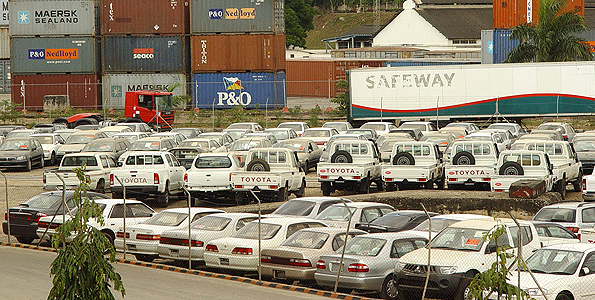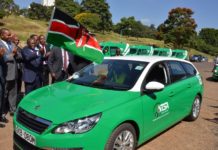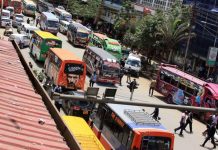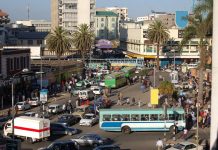By REUBEN MWAMBINGU
With the traffic on roads getting heavier by the day, this is an indication that a growing number of Kenyans are buying vehicles. In view of this, perhaps one can only imagine of people in highly prof- itable deals whenever car importers are mentioned. However, this impression might be untrue.
When you meet vehicle importers, they will tell you what they encounter on the ground, painting a stark picture which is totally different from what many people imagine. Today, car importers in the Country are an unhappy lot.
They are entangled in the midst of a myriad of impediments ranging from what they describe as superfluous taxing by the Kenya Revenue Authorityn (KRA), to rampant shortage of motor vehicle number plates. And it is out of these challenges that the importers claim that they sometimes incur immense losses running to hundreds of thousands of shillings a situation said to be unhealthy to the business.
Car Importers Association of Kenya, National Chairman, Peter Otieno, is concerned that the Kenya Revenue Authority rule that requires that all imported vehicles be fitted with number plates before leaving Container Freight Station (CFS) at the Mombasa port as a way curbing tax evasion is imposing challenges.
He says the rule has seen importers encounter difficulties in selling vehicles with older registration numbers in Mombasa, especially because most vehicles are usually delayed at the port awaiting the registration numbers and by the time they are ready to go for display at the showroom, several new registration numbers would have arrived thereby vehicles with older registration numbers end up being outdate at the expense of those with new numbers.
“The issuance of the registration plates is usually delayed thereby forcing vehicles to remain at the CFS even after importers comply with the payment of all the taxes as required. By the time the plate comes, new others have arrived and when the vehicles go to the showrooms for display, car dealers face difficulties in convincing the buyers to purchase the ones with older registration number because customers always rush to those with latest registration plates,” he says.
In this regard he says the importers want the vehicles meant for display at the showrooms be allowed to leave the CFS without the registration numbers and await the registration while at the showroom. “These should strictly apply to vehicles going to the showrooms so that imported cars can stay on display without number plates,” notes Otieno.
“Some of our members have been incurring losses of between, Sh 100,000 and Sh 300,000 just because of delays in number plates. For instance, as at now, we have some of our members who still have vehicles with registration numbers KBS, KBT and KBR on display at their showrooms.
They have faced difficult time convincing customers to buy them because each time the customer comes other vehicles with latest registration say KBW, he or she will think that the KBS and the rest are old ones in spite that they are of the same batch. In such a case you will find the customer having the upper hand in the price negotiation thereby sometimes forcing the dealers to sell the vehicles at a cheaper price,” notes the chair.
He reckons that in most cases this translates to loss in the deal especially putting into consideration that the importers are forced to cough out heavily in the taxation of their shipments. “After the cargo is offloaded from the ship, motor vehicle importers are usually given four days to finalise with their clearing processes.
But if the cargo delays and extends to the fifth day, CFS operators start charging storage charges. They also demand wharfage and re-marshalling charges, which is the penalty for delays. We have been incurring inevitable storage charges of a minimum of Sh 5000 and above,” he explains and adds that he believes that this can be avoided.
KRA officials came up with the restrictions that no vehicle should leave the CFS without the registration plate as a way of curtailing highway crime which the authorities observe is normally committed using unregistered vehicles.
The authority believes that carjackers and highway robbers target vehicles without registration numbers and therefore it is not safe to allow such vehicles out of the CFS. But last month KRA issued a statement indicating that vehicles would be allowed out of port without number plates as long as taxes are paid in full or exemption process finalised.
Vehicle importers are also required to remove all foreign number plates before the cas leave the port according to the statement. “The authority will maintain appropriate records of all motor vehicles released under this arrangement indicating among other details, the registration number assigned to the vehicle,” KRA said in a statement.
The agency said the release of vehicles will be done by the cluster manager of the relevant container freight stations (CFS). “Regarding motor vehicles entered for clearance at Kilindini, release will be done by the deputy commissioner or in his absence, the deputy. “The temporary measure will continue to apply pending resumption of normal supply of the motor vehicle number plates as soon as possible,” KRA said.
However, cars without number plates are more prone to theft. But the importers view the allegations as false and unfounded, on grounds that number plates cannot bar determined criminals from stealing vehicles because they can always remove the plates.
Adopted from: The People









![Top 20 Used Cars to Avoid Buying in Kenya – [PHOTOS]](../../../blog/wp-content/uploads/2013/11/top-used-unreliable-cars-to-avoid2-80x60.jpg)

![Top 20 Used Cars to Avoid Buying in Kenya – [PHOTOS]](../../../blog/wp-content/uploads/2013/11/top-used-unreliable-cars-to-avoid2-100x70.jpg)





